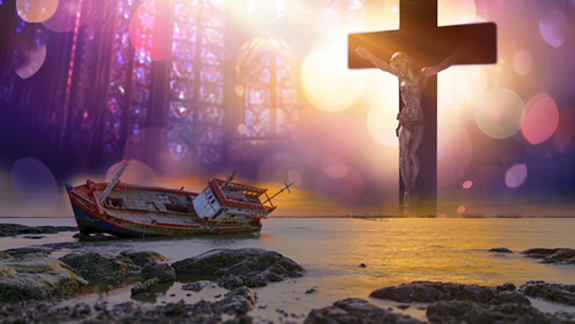

A strange thing happened to me the other day. My left knee went on strike. Refused to do its assigned job. Abandoned its work altogether. As so often happens in these cases, there were consequences to be had. The most notable was that I found myself unable to walk. I had been making my way across a large parking lot into a large retail establishment (too large, perhaps), and by the time I got inside the store I was clinging to wall displays and shopping carts and unsuspecting customers until I got the attention of a clerk who promptly rounded up a wheelchair and returned me to my car. It was obvious that I was not going to be buying anything, and I was taking up a perfectly good parking place. Best to get me out of there.
The rest of my day involved sitting on a couch in my study, not at all a bad place to be, but looking and acting shockingly helpless. At least I was shocked. My family has always known that I am helpless, but this time I was in on it.
All those simple steps one takes for granted—getting a pencil, getting a book, getting a glass of water—were suddenly not simple at all. And not granted. Almost impossible. Even moving a short distance became an elaborate and painful production.
So naturally I thought of G.K. Chesterton.
Something similar happened to him. He sprained his foot and experienced the same consequences that I experienced: that is, he (1.) found himself limited to the use of only one leg, and (2.) wrote an essay about it. His was better than this one, of course. Under the typically paradoxical title, “The Advantages of Having One Leg,” he reflected on how the real annoyances in life are not worth complaining about but rather, opportunities to give thanks, especially to give thanks for the things we have forgotten to be thankful for. “This world and all our powers in it are far more awful and beautiful than we even know until some accident reminds us.”
We will appreciate both our legs much more if we try standing on just one of them. We will appreciate the splendid vision of a visible things by winking with both eyes. “The way to love anything,” says Chesterton, “is to realize that it might be lost.” Wise words worth repeating. “The way to love anything is realize that it might be lost.”
He makes the same point in his great book Orthodoxy, where he talks about the famous story of Robinson Crusoe.
Crusoe is a man on a small rock with a few comforts just snatched from the sea: the best thing in the book is simply the list of things saved from the wreck. The greatest of poems is an inventory. Every kitchen tool becomes ideal because Crusoe might have dropped it in the sea. It is a good exercise, in empty or ugly hours of the day, to look at anything, the coal-scuttle or the book-case, and think how happy one could be to have brought it out of the sinking ship on to the solitary island. But it is a better exercise still to remember how all things have had this hair-breadth escape: everything has been saved from a wreck.
Chesterton says this exercise of being thankful is to “celebrate the poetry of limits.” A perfect prelude to the Feast of Thanksgiving, our great secular holiday which can never escape religious significance, because one cannot be thankful without having someone else to thank. And the exercise Chesterton describes would be a good ritual for everyone around the table to take in turn before passing the mashed potatoes and gravy. Look about at every little thing in the room and think of how happy we would be to have saved it from sinking into the sea.
And then consider that we have all been “saved from a wreck.”
The same metaphor applies on a cosmic scale. The whole world started off very well. Everything was perfect. A lovely landscape brimming with life, health, provision, peace, communion with God and companionship with each other. Then came the wreck. Instead of contentment with what we had, we desired what was forbidden, and everything was almost lost because sin and death entered our garden. Almost lost.
We lost the garden, but we found a hope that put the whole glory of creation into a new perspective. The world carried on under a curse, but instead of utter ruination, there came the promise of salvation. All the things that might have been completely loss suddenly became more precious. Not only the useful tools and the basic pleasures, but the ones who get to use the tools and experience the pleasures. Not only the beauty but the eyes that see the beauty. And not only life, but eternal life. We have been saved from the wreck. Chesterton says we are, each one of us, “a great-might-not-have-been.”
If you value the news and views Catholic World Report provides, please consider donating to support our efforts. Your contribution will help us continue to make CWR available to all readers worldwide for free, without a subscription. Thank you for your generosity!
Click here for more information on donating to CWR. Click here to sign up for our newsletter.


